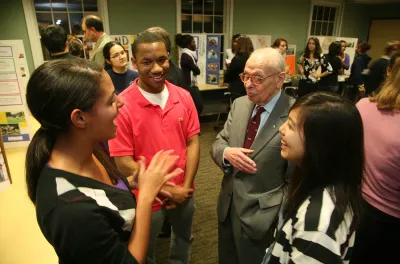History
Guided by its Quaker heritage, Swarthmore College has since its inception declared a commitment to provide academic excellence in the context of social responsibility, by helping its students realize their fullest intellectual and personal potential combined with a deep sense of ethical and social concern. Swarthmore College students, faculty, and staff have long engaged issues of social responsibility, combined with a rigorous approach to intellectual inquiry. Students are encouraged to study and actively work toward positive social change in the areas of social and political issues to which they are committed.
The Lang Center supports faculty, students, and staff with advice and guidance, space for meetings and events, transportation resources, as well as funding for projects, internships, teaching, and research. The Lang Center encourages faculty, staff, and students to be involved with surrounding communities locally and globally, for mutual benefit and reciprocally enriching relationships.
The Lang Center's programming includes a rotating visiting professorship that brings to campus activists or academics committed to social justice, civil liberties, human rights, and democracy for teaching and community interaction; grant programs that support the pursuit of projects, research, and internships; and faculty grants that support engaged scholarship.
We collaborate with community partners in all of these endeavors. A collaboration of particular note is the Chester-Swarthmore Fellows Council. Fellows, chosen from Chester civic leaders, advise our community-based efforts. Launched in Fall 2021, Fellows convene with us regularly throughout the year, and are available for brief consultations (as they arise) with students, faculty members, and staff. The Chester-Swarthmore Fellows program is animated by the values of reciprocity and mutual benefit, and a shared dedication to advancing Chester's interests as Chester community members define them.
The heart of the approach to social responsibility at Swarthmore is the high energy and deep commitment that its students, faculty, and staff bring to it. The goal of the College and the Lang Center is to provide a learning environment that supports our College community members and the communities of which we are a part.
About Eugene M. Lang ’38

Eugene M. "Gene" Lang '38 talking with students at Lang Center
Eugene M. “Gene” Lang ’38 (1919-2017), chair emeritus of the College’s Board of Managers, was a giant in the world of education, a champion of the liberal arts, and an acknowledged force in promoting civic and social responsibility among students, faculties, and educational institutions. He not only helped realize the dreams of thousands of students at Swarthmore and around the country, he also inspired countless others to act similarly, most notably through the example he set by establishing the “I Have A Dream” Foundation, for which he was a recipient of the Presidential Medal of Freedom.
In 2001, Lang created the endowment to establish the Lang Center for Civic and Social Responsibility. In addition to the Lang Center, his gifts to Swarthmore include the Lang Music Building, the Eugene and Theresa Lang Performing Arts Center, endowed professorships, support for faculty research and student financial aid, the Lang Summer Social Action Awards, and the Lang Opportunity Scholars Program, which provides funds for students to design and carry out long-term social action projects. He was also the founder of Project Pericles, a national organization of colleges and universities working to encourage and facilitate inclusion of education for social responsibility and participatory citizenship as an essential part of their educational programs.
Endowment Agreement
From the endowment agreement creating “The Eugene M. Lang Center for Civic and Social Responsibility"
Purpose
“The Center shall provide vision, leadership and support for the College’s central commitment to educate students for civic and social responsibility. The Center shall serve as the central organizational and administrative umbrella for groups and activities that are related to civic and social responsibility and as a primary structure to foster and facilitate courses and educational experiences that carry a community-based learning component, and to establish an awareness of connections between courses and issues of civic and social responsibility.”
Mission and Charge
“The Center, through its Executive Director and staff, will create, organize, administer and evaluate activities that link rigorous intellectual training to the motivation and preparation of students to take leadership in shaping a more just and humane world. The Center will foster understanding of the role democratic institutions and processes can play in creating such a world. The Center will stimulate critical reflection, teaching, research, publications, and experimentation aimed at educating for civic and social responsibility. Through conferences and collaborative relationships and constructive initiatives and research of students and faculty, the Center will promote the College’s leadership in making preparation for participatory citizenship and socially responsible action a nation-wide feature of higher education.”
Under "Governance of the Center"
“The Center will serve as the central facility for organizing, administering and generally overseeing socially and civically-oriented programs and projects of the College. These programs and projects will include student volunteer service groups, the Swarthmore Foundation, student service internships, organized multi-cultural and service initiatives with defined social objectives involving student participation on and off campus, the Lang Opportunity Scholars Program, the Learning for Life Program, the Lang Visiting Professorship for Issues of Social Change, the Lang Grants, Project Pericles, and such other programs whose design, implementation or evaluation may variously employ the resources of the Center.”




